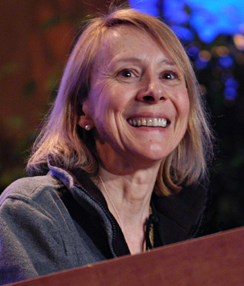“Don’t teach people how to fish, but teach them to build fishing schools.” Esther Dyson’s long term thinking on healthcare in a short attention span world.

Esther Dyson spoke at a CapGemini event recently. If the name is unfamiliar, her LinkedIn profile is a start, but it’s not the half of it. Dyson was an early tech guru, impresario of the highly influential PC Forum conference and the Release 1.0 newsletter, and friendly with Steve Jobs, Bill Gates – and Yours Truly.
Esther is a long-term thinker in a short attention span world. Her current focus: Wellville, where she has gone into five communities to disrupt healthcare by stopping health problems before they become problems, through education. As she put it, not to teach people how to fish, but how to build fishing schools. Will her program, which she calls not a startup but rather, the beginnings of a restaurant chain, make a difference? Time will tell: she’s four years into a 10-year project. As for the difference between long and short term thinking: her team is educating people about healthy food and food preparation, rather than delivering meal kits or take-out with the results (potentially) being making a difference on long-term health, rather than achieving a quick billion-dollar valuation. And bringing down insurance payouts and by extension, health care costs. A potentially multi-billion dollar savings.
Long-term thinking.
It may pay to keep your eyes on the road ahead, rather than to the first truck stop on the so-called information superhighway.
“If I were a maid, I’d like a dirty room,” she said. “That’s why I like Russia and healthcare. They’re a mess.”
Difficult problems tend not to be solved by apps or the latest fitbit iteration. The idea is to build these communities, then have the formats go viral. Or domino.
Thus, restaurant chain. Wellville isn’t so much a matter of giving back, but rather changing the model, and playing it forward. And note to self: restaurant chains do well. Think McDonald’s. Hold the fries.
Disruption, reimagined.
A heads up for those of you focused on social good. Look at it this way: a big part of Wellville is data collection put to good use, or as Dyson advised, “Don’t take a job for which you’re already qualified.”
We happen to be a big fan of real world solutions, and sustainability, in the Esther Dyson sense of the word: building a platform that will help people to help themselves – and the community. Rather than throwing money at the problems, the communities themselves are raising the funds and awareness.
Dyson was not a subject matter expert when she took on this challenge.
She’s not a fan of short-term thinking, either, so it was a matter of peeling back the layers or as she put it, “not that you didn’t know it – you weren’t paying attention…If you don’t pay for early childhood education, you’ll be paying for it later,” said Dyson.
“The problem is not the cost of healthcare. It’s the need for healthcare,” and that’s the messy room she decided to tackle. Not via pure tech, but human contact. Tech needs to remember that there are people on the other side of those screens, living, in no small part thanks to tech, the lack of privacy and the myriad problems that the Age of Social has created, in messy rooms.
It’s high time the industry got its house in order. Onward and forward.